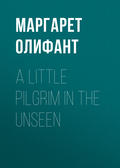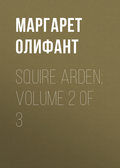
Маргарет Олифант
Sir Tom
Bice lifted her eyes upon this man with a wondering gaze of contempt. She gave him a full look which abashed him, though he was so much more important, so much more intellectual, than she. Then, without deigning to take any notice, she turned to Jock at her other side. "If that is all I do not care for going," she said. "I have seen many plays – oh, many! I like quite as well to read at home. It is not for that I wish to go; but to see the world. The world, that is far more interesting. It is like a novel, but living. You look at the people and you read what they are thinking. You see their stories going on. That is what amuses me; – but a play on the stage, what is it? People dressed in clothes that do not belong to them, trying to make themselves look like somebody else – but they never do. One says – that is not I, but the people that know – Bravo, Got! Bravo Regnier! It does not matter what parts they are acting. You do not care for the part. Then why go and look at it?" said Bice with straightforward philosophy.
All this she poured forth upon Jock in a low clear voice, as if there was no one else near. Jock, for his part, was carried away by the flood.
"I don't know about Got and Regnier. But what we are going to see is Shakespeare," he said, with a little awe, "that is not just like a common play."
Mr. Derwentwater had been astonished by Bice's indifference to his own instructive remarks. It was this perhaps more than her beauty which had called his attention to her, and he had listened as well as he could to the low rapid stream of her conversation, not without wonder that she should have chosen Jock as the recipient of her confidence. What she said, though he heard it but imperfectly, interested him still more. He wanted to make her out – it was a new kind of study. While Lucy, by his side, went on tranquilly with some soft talk about the theatre, of which she knew very little, he thought, he made her a civil response, but gave all his attention to what was going on at the other side; and there was suddenly a lull of the general commotion, in which he heard distinctly Bice's next words.
"What is Shakespeare?" she said; then went on with her own reflections. "What I want to see is the world. I have never yet gone into the world; but I must know it, for it is there I have to live. If one could live in Shakespeare," cried the girl, "it would be easy; but I have not been brought up for that; and I want to see the world – just a little corner – because that is what concerns me, not a play. If it is only for the play, I think I shall not go."
"You had much better come," said Jock; "after all it is fun, and some of the fellows will be good. The world is not to be seen at the theatre that I know of," continued the boy. "Rows of people sitting one behind another, most of them as stupid as possible – you don't call that the world? But come – I wish you would come. It is a change – it stirs you up."
"I don't want to be stirred up. I am all living," cried Bice. There seemed to breathe out from her a sort of visible atmosphere of energy and impatient life. Looking across this thrill in the air, which somehow was like the vibration of heat in the atmosphere, Jock's eyes encountered those of his tutor, turned very curiously, and not without bewilderment, to the same point as his own. It gave the boy a curious sensation which he could not define. He had wished to exhibit to Mr. Derwentwater this strange phenomenon in the shape of a girl, with a sense that there was something very unusual in her, something in which he himself had a certain proprietorship. But when MTutor's eyes encountered Jock's with an astonished glance of discovery in them, which seemed to say that he had found out Bice for himself without the interposition of the original discoverer, Jock felt a thrill of displeasure, and almost pain, which he could not explain to himself. What did it mean? It seemed to bring with it a certain defiance of, and opposition to, this king of men.
CHAPTER XXXI.
TWO FRIENDS
"Who was that young lady?" Mr. Derwentwater said. "I did not catch the name."
"What young lady?" To suppose for a moment that Jock did not know who was meant would be ridiculous, of course; but, for some reason which he did not explain even to himself, this was the reply he made.
"My dear Jock, there was but one," said MTutor, with much friendliness. "At your age you do not take much notice of the other sex, and that is very well and right; but still it would be wrong to imagine that there is not something interesting in girls occasionally. I did not make her out. She was quite a study to me at the theatre. I am afraid the greater part of the performance, and all the most meritorious portion of it, was thrown away upon her; but still there were gleams of interest. She is not without intelligence, that is clear."
"You mean Bice," said Jock, with a certain dogged air which Mr. Derwentwater had seldom seen in him before, and did not understand. He spoke as if he intended to say as little as was practicable, and as if he resented being made to speak at all.
"Bice – ah! like Dante's Bice," said MTutor. "That makes her more interesting still. Though it is not perhaps under that aspect that one represents to oneself the Bice of Dante —ben son, ben son, Beatrice. No, not exactly under that aspect. Dante's Bice must have been more grand, more imposing, in her dress of crimson or dazzling white."
Jock made no response. It was usual for him to regard MTutor devoutly when he talked in this way, and to feel that no man on earth talked so well. Jock in his omnivorous reading knew perhaps Dante better than his instructor, but he had come to the age when the mind, confused in all its first awakening of emotions, cannot talk of what affects it most. The time had been at which he had discussed everything he read with whosoever would listen, and instructed the world in a child's straightforward way. At that period he had often improved Lucy's mind on the subject of Dante, telling her all the details of that wonderful pilgrimage through earth and heaven, to her great interest and wonder, as something that had happened the other day. Lucy had not in those days been quite able to understand how it was that the gentleman of Florence should have met everybody he knew in the unseen, but she had taken it all in respectfully, as was her wont. Jock, however, had passed beyond this stage, and no longer told Lucy, or any one, stories from his reading; and other sensations had begun to stir in him which he could not put into words. In this way it was a constant admiration to him to hear MTutor, who could always, he thought, say the right thing and never was at a loss. But this evening he was dissatisfied. They were returning from the theatre by a late train, and nothing but Jock's reputation and high character as a boy of boys, high up in everything intellectual, and without reproach in any way, besides the devoted friendship which subsisted between himself and his tutor, could have justified Mr. Derwentwater in permitting him in the middle of the half to go to London to the theatre, and return by the twelve o'clock train. This privilege came to him from the favour of his tutor, and yet for the first time his tutor did not seem the superhuman being he had always previously appeared to Jock. But Mr. Derwentwater was quite unsuspicious of this.
"There is something very much out of the way in the young lady altogether," he said. "That little black dress, fitting her like a glove, and no ornament or finery of any description. It is not so with girls in general. It was very striking – tell me – "
"I didn't think," cried Jock, "that you paid any attention to what women wore."
Mr. Derwentwater yielded to a gentle smile. "Tell me," he said, as if he had not been interrupted, "who this young lady may be. Is she a daughter of the Italian lady, a handsome woman, too, in her way, who was with your people?" The railway carriage in which they were coursing through the blackness of the night was but dimly lighted, and it was not easy to see from one corner to another the expression of Jock's face.
"I don't know," said Jock, in a voice that sounded gruff, "I can't tell who she is – I never asked. It did not seem any business of mine."
"Old fellow," said MTutor, "don't cultivate those bearish ways. Some men do, but it's not good form. I don't like to see it in you."
This silenced Jock, and made his face flame in the darkness. He did not know what excuse to make. He added reluctantly: "Of course I know that she came with the Contessa; but who she is I don't know, and I don't think Lucy knows. She is just – there."
"Well, my boy," said Mr. Derwentwater, "if there is any mystery, all right; I don't want to be prying;" but, as was natural, this only increased his curiosity. After an interval, he broke forth again. "A little mystery," he said, "suits them; a woman ought to be mysterious, with her long robes falling round her, and her mystery of long hair, and all the natural veils and mists that are about her. It is more poetic and in keeping that they should only have a lovely suggestive name, what we call a Christian name, instead of a commonplace patronymic, Miss So-and-so! Yes; I recognise your Bice as by far the most suitable symbol."
It is impossible to say what an amount of unexpressed and inexpressible irritation arose in the mind of Jock with every word. "Your Bice!" The words excited him almost beyond his power of control. The mere fact of having somehow got into opposition to MTutor was in itself an irritation almost more than he could bear. How it was he could not explain to himself; but only felt that from the moment when they had got into their carriage together, Mr. Derwentwater, hitherto his god, had become almost odious to him. The evening altogether had been exciting, but uncomfortable. They had all gone to the theatre, where Jock had been prepared to look on not so much at a fine piece of acting as at a conscientious study, the laboriousness of which was one of its chief qualities. Neither the Contessa nor Bice had been much impressed by that fine view of the performance. Madame di Forno-Populo, indeed, had swept the audience with her opera-glass, and paid very little attention to the stage. She had yawned at the most important moments. When the curtain fell she had woke up, looking with interest for visitors, as it appeared, though very few visitors had come. Bice was put into the corner under shelter of the Contessa, and thence had taken furtive peeps, though without any opera-glass, with her own keen, intelligent young eyes, at the people sitting near, whom Jock had declared not to be in any sense of the word the world. Bice too looked up, when the box door opened, with great interest. She kept well in the shade, but it was evident that she was anxious to see whosoever might come. And very few people came; one or two men who came to pay their respects to Lucy, one or two who appeared with faces of excitement and surprise to ask if it was indeed Madame di Forno-Populo whom they had seen? At these Bice from out her corner gazed with large eyes; they were not persons of an interesting kind. One of them was a Lord Somebody, who was red-faced and had an air which somehow did not suit the place in which Lucy was, and towards whom Sir Tom, though he knew him, maintained an aspect of seriousness not at all usual to his cordial countenance. Bice, it was evident, was struck with a contemptuous amaze at the appearance of these visitors. There was a quick interchange of glances between her and the Contessa with shrugs of the shoulders and much play of fans. Bice's raised eyebrows and curled lips perhaps meant – "Are those your famous friends? Is this all?" Whereas the Contessa answered deprecatingly, with a sort of "wait a little" look. Jock, who generally was pleased to stroll about the lobbies in a sort of mannish way in the intervals between the acts, sat still in his place to watch all this with a wondering sense that here was something going on in which there was a still closer interest, and to notice everything almost without knowing that he noted it, following in this respect, as in most others, the lead of his tutor, who likewise addressed himself to the supervision of everything that went on, discoursing in the meantime to Lucy about the actors' "interpretation" of the part, and how far he, Mr. Derwentwater, agreed with their view. To Lucy, indeed, the action of the play was everything, and the intervals between tedious. She laughed and cried, and followed every movement, and looked round, hushing the others when they whispered, almost with indignation. Lucy was far younger, Jock decided, than Bice or even himself. He, too, had learned already – how had he learned it? – that the play going on upon the stage was less interesting than that which was being performed outside. Even Jock had found this out, though he could not have told how. Shakespeare, indeed, was far greater, nobler; but the excitement of a living story, the progress of events of which nobody could tell what would come next, had an interest transcending even the poetry. That was what people said, Jock was aware, in novels and other productions; but until to-night he never believed it was true.
And then there was the journey from town, with all the curious sensation of parting at the theatre doors, and returning from that shining world of gaslight, and ladies' dresses, into the dimness of the railway, the tedious though not very long journey, the plunging of the carriage through the blackness of the night; and along with these the questions of Mr. Derwentwater, so unlike him, so uncalled-for, as Jock could not help thinking. What had he to do with Bice? What had any one to do with her? So far as she belonged to any one, it was to himself, Jock; her first friend, her companion in her walks, he to whom she had spoken so freely, and who had told her his opinion with such simplicity. When Jock remembered that he had told her she was not pretty his cheeks burned. There had stolen into his mind, he could not tell how, a very different feeling now – not perhaps a different opinion. When he reflected it did not seem to him even now that pretty was the word to use – but the impression of Bice which was in his mind was something that made the boy thrill. He did not understand it, nor could he tell what it was. But it made him quiver with resentment when there was any question about her – anything like this cold-blooded investigation which Mr. Derwentwater had attempted to make. It troubled Jock all the more that it should be MTutor who made it. When our god, our model of excellence, comes down from his high state to anything that is petty, or less than perfect, how sore is the pang with which we acknowledge it. "To be wroth with those we love doth work like madness in the brain." Jock had both these pangs together. He was angry because MTutor had been interfering with matters in which he had no concern, and he was pained because MTutor had condescended to ask questions and invite gossip, like the smaller beings well enough known in the boy-world as in every other, who make gossip the chief object of their existence. Could there be anything in the idol of his youth akin to these? He felt sore and disappointed, without knowing why, with a dim consciousness that there were many other people whom Mr. Derwentwater might have inquired about without awakening any such feelings in him. When the train stopped, and they got out, it was strange to walk down the silent, midnight streets by MTutor's side, without the old sensation of pleasure with which the boy felt himself made into the man's companion. He was awakened out of his maze of dark and painful feelings by the voice of Derwentwater calling upon him to admire the effect of the moonlight upon the river as they crossed the bridge. For long after that scene remained in Jock's mind against a background of mysterious shadows and perplexity. The moon rode in the midst of a wide clearing of blue between two broken banks of clouds. She was almost full, and approaching her setting. She shone full upon the river, sweeping from side to side in one flood of silver, broken only by a few strange little blacknesses, the few boats, like houseless stragglers out by night and without shelter, which lay here and there by a wharf or at the water's edge. The scene was wonderfully still and solemn, not a motion to be seen either on street or stream. "How is it, do you think," said Mr. Derwentwater, "that we think so little of the sun when it is he that lights up a scene like this, and so much of the moon?"
Jock was taken by surprise by this question, which was of a kind which his tutor was fond of putting, and which brought back their old relations instantaneously. Jock seemed to himself to wake up out of a strange inarticulate dream of displeasure and embarrassment, and to feel himself with sudden remorse, a traitor to his friend. He said, faltering: "I don't know; it is always you that finds out the analogies. I don't think that my mind is poetical at all."
"You do yourself injustice, Jock," said Derwentwater, his arm within that of his pupil in their old familiar way. And then he said: "The moon is the feminine influence which charms us by showing herself clearly as the source of the light she sheds. The sun we rarely think of at all, but only of what he gives us – the light and the heat that are our life. Her," he pointed to the sky, "we could dispense with, save for the beauty of her."
"I wish," said Jock, "I could think of anything so fine. But do you think we could do without women like that?" said the inquiring young spirit, ready to follow with his bosom bare whithersoever this refined philosophy might lead.
"You and I will," said the instructor. "There are grosser and there are tamer spirits to whom it might be different. I would not wrong you by supposing that you, my boy, could ever be tempted in the gross way; and I don't think you are of the butterfly dancing kind."
"I should rather think not!" said Jock, with a short laugh.
"Then, except as a beautiful object, setting herself forth in conscious brightness, like that emblem of woman yonder," said MTutor with a wave of his hand, admiring, familiar, but somewhat contemptuous, towards the moon, "what do we want with that feminine influence? Our lives are set to higher uses, and occupied with other aims."
Jock was perfectly satisfied with this profession of faith. He went along the street with his tutor's arm in his, and a vague elation as of something settled and concluded upon in his mind. Their footsteps rang upon the pavement with a manly tramp as they paced away from the light on the bridge into the shadow of the old houses with their red roofs. They had gone some way before, being above all things loyal, Jock thought it right to put in a proviso. "Not intellectually, perhaps," he said, "but I can't forget how much I owe to my sister. I should have been a most forlorn little wretch when I was a child, and I shouldn't be much now, but for Lucy standing by me. It's not well to forget that, is it, sir? though Lucy is not at all clever," he added in an undertone.
"You are a loyal soul," said MTutor, with a pressure of his arm, "but Woman does not mean our mothers and sisters." Here he permitted himself a little laugh. "It shows me how much inferior is my position to that of your youth, my dear boy," he said, "when you give me such an answer. Believe me it is far finer than anything you suppose me to be able to say."
Jock did not know how to respond to this speech. It half angered, half pleased him, but on the whole he was more ashamed of the supposed youthfulness than satisfied with the approbation. No one, however young, likes the imputation of innocence; and Jock had feelings rising within him of which he scarcely knew the meaning, but which made him still more sensible of the injustice of this view. He was too proud, however, to explain himself even if he had been able to do so, and the little way that remained was trodden in silence. The boy, however, could not help a curious sensation of superiority as he went to his room through the sleeping-house, feeling the stillness of the slumber into which he stole, treading very quietly that he might not disturb any one. He stopped for a moment with a candle in his hand and looked down the long passage with its line of closed doors on each side, holding his breath with a half smile of sympathy, respect for the hush of sleep, yet keen superiority of life and emotion over all the unconscious household. His own brain and heart seemed tingling with the activity and tumult of life in them. It seemed to him impossible to sleep, to still the commotion in his mind, and bring himself into harmony with that hushed atmosphere and childish calm.







